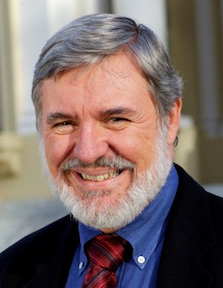“I am presenting research on how existing legal structures—both preventive environmental health laws and personal injury (or tort) law—combined with what is known from the pertinent science can help us do the right thing: make the world a safer place from chemical creations that enter commerce.”
—Carl Cranor
By Karys Blakemore
Carl Cranor, the recent recipient of the Romanell-Phi Beta Kappa Professorship in Philosophy for 2014-2015, has made significant strides in the analysis and criticism of the current philosophic relationship between science and law, namely in relation to the regulation of chemical compounds that can negatively affect health.
Currently a distinguished professor of philosophy at the University of California, Riverside, Cranor has had an impressive academic career: he received a bachelor’s degree in mathematics from the University of Colorado, a Master of Studies in Law degree from Yale University and a Ph. D. in philosophy from UCLA. Furthermore, his areas of expertise include legal and moral philosophy, acceptable risk, science and the law and the regulation of carcinogens and developmental toxicants.
Cranor has used this extensive academic background as a tool in his examination of the intrinsic shortcomings of the laws that currently regulate chemical compounds in the American free market. According to Cranor, “Diseases and dysfunctions can be predisposed or triggered by toxicants in utero or after birth … Babies are born with up to 200 chemical contaminants, some toxic. Yet the laws that aim to protect us simply cannot do the job because the vast percentage of industrial chemicals enter commerce without any toxicity data.” Thus, Cranor’s work is impressive because it not only highlights the necessity to better the working relationship between science and law, but also brings attention to a danger of which many of us may not be aware.
In a recent online interview with Cranor, he elaborated on his successes, goals as a professional and areas of academic interest. When asked, for example, about personal achievements of which Cranor was particularly proud, he mentioned three fellowships in particular: the ACLS Fellowship (1980-1981), the Yale Law School Fellowship (1980-1981) and the Congressional Fellowship (1985-1986). To Cranor, these fellowships have personal significance because they, “… reflected varying degrees of recognition of what … [he] had accomplished at the time of each fellowship … and more importantly supported the development of skills and knowledge that led to dramatic career changes.” Furthermore, Cranor stated that the Romanell-Phi Beta Kappa Professorship in Philosophy was the highlight of his career to date that he was honored to share with its previous participants.
During the interview, Cranor also related an example of the concrete application of his research in protecting a citizen’s rights and health. In 2011, Cranor testified in support of Brian Milward, a victim of exposure to Benzene, in the legal case Milward v. Acuity Specialty Products. Cranor’s testimony was not only instrumental in helping Milward receive compensation for his injuries, but also in changing judicial attitudes towards the inclusion of more scientific research in court cases: “… the Federal Circuit Court of Appeals, First Circuit, accepted and endorsed conclusions for which I had argued that permitted a full range of scientific evidence to be presented on a complex scientific issue. In many courts prior to this, such a wide range of evidence would not have been permitted.”
Those interested in learning more about Cranor’s research should reference his many publicized works, which include, Legally Poisoned: How the Law Puts Us at Risk from Toxicants (2011). This most recent book by Cranor provides an in-depth examination of chemicals that can pose risks to children during development.
And for those of us who, upon hearing about Cranor’s successes, may feel that such accomplishments are beyond us, Cranor has this to say: “Few people know that my family background resembles that of many students in today’s universities. I was the first of my immediate family to graduate from high school, from college, and from graduate school. Neither my father nor mother attended high school.” The message of Cranor’s career, then, is that anyone is capable of greatness, of becoming involved in the effort to solve the most pressing of societal issues. The key is simply to step out the door and begin the journey: “Early on there certainly was not a grand plan to do what I am now doing; I made one life-changing decision after another as possibilities presented themselves.”
Karys Blakemore is currently a senior at George Mason University majoring in Russian and Eurasian Studies and Spanish as a foreign language. She became a member of Phi Beta Kappa in her junior year. George Mason is home to the Omicron of Virginia Chapter of Phi Beta Kappa.




